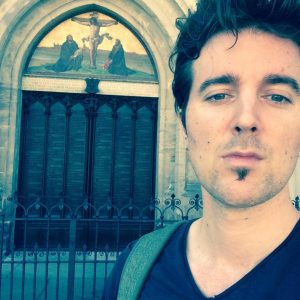“On the Spot” backs members of Culture on the Edge into a corner to talk about their backgrounds, their ongoing work, and what might be gained by an alternative understanding of how identity works.
 1. When people ask what you study, what do you tell them?
1. When people ask what you study, what do you tell them?
My current elevator pitch is that I study religion, culture, and politics in the Euro-West, with an emphasis on North America. When I expand on this description, I typically say that my work centers on questions of religion in the public sphere. On the meta-level this means paying attention to how dominant ideologies, such as multiculturalism, liberalism, and secularism, construct how ‘religion’ is mediated or understood and thus how it functions to regulate group identities in particular ways. As for methodology, I tend to rely on ideology critique, along with discourse and narrative analysis (including theories of affect and rhetoric) to examine the various ways that religion and culture are represented — in news media, film, and popular culture. While my data is, in theory, open to any groups that make these sort of claims, I tend to focus on insiders and outsiders representations of Islam, (North American) Indigenous traditions, atheism, and Christianity.
2. How do questions of identity manifest in your research?
Questions of identity are often central to kind of work that I do. For example, I’ll look at popular examples of how religion (or secularism) is narrated (e.g., by pundits, politicians, or in pop culture) as instances of identity formation. Here the focus is on how actors attempt to draw lines around what, e.g., ‘Islam’ or ‘Christianity’ is, while at the same time failing to reflect upon the ways in which these normative statement function to shore-up their own identities (e.g., as superior, better, more rational, ethical, etc.). In short, this line of inquiry forces us to ask where (and why) people are ‘hiding the ball’?
3. Can you give us an example of this from your previous work?
A great example of this that I’ve used in the past comes from an episode of Real Time with Bill Maher, where Maher and ‘new atheist’ Sam Harris get into a confrontation with the actor Ben Affleck over the supposed lack of ‘liberal values’ in the ‘Muslim world.’ What initially sparked this confrontation were comments made by Maher from the previous week’s episode of Real Time (September 26, 2014), when he stated:
If vast numbers of Muslims across the world believe, and they do, that humans’ deserve to die for merely holding a different idea or a drawing a cartoon or writing a book or eloping with the wrong person, not only does the Muslim world have something in common with ISIS, it has too much in common with ISIS.
Maher elaborated on these points during the following week’s episode by speaking about the universality of “liberal principles” such as “freedom of speech freedom to practice any religion you want without fear of violence, freedom to leave a religion, equality for women, equality for minorities, including homosexuals…”
So where’s the ball Bill? At least three things are evident here that tell us much more about Maher’s identity than they do about Muslims or ‘Islam.’ First, Maher has adopted a naturalized view of religion as belief; second, he understands freedom of speech through a Euro-and-Christo-centric lens (e.g., he understands critiquing Islamic views on blasphemy as no different than critiquing the Pope or Jerry Falwell, without accounting for differences in culture, racialization, etc.); and, third, he positions and evaluates ‘Islam’ in relation to “liberal principles.” In each instance, Maher’s own identity formation is clearly on display (e.g., his values, biases, and epistemological preferences). Paying attention to these dynamics as the primary source of analysis (as opposed to his claims about ‘Islam’) is one clear way to go about studies in identity.
4. Where are you hoping to go next with your scholarship?
One avenue that I’ve been pursing more and more of late combines my interest in popular atheism (and movement atheism) with representations of Islam in the Euro-West. Specifically, I’m interested in shifting identity formations of those who describe themselves as ‘ex-Muslim.’ While a majority of Western ex-Muslims were able to find a voice within movement atheism following the post-9/11 popularity of the ‘new atheists’ (and adopted many of the traits and talking points that we see in the example from Bill Maher above), recent developments, such as the rise of Donald Trump, the alt-right, as well as charges of misogyny, racism, and Islamophobia against movement atheism, have created rifts within these communities, revealing the emergence of new identity formations — though currently without a clear niche of their own. Focusing on the re-alignment of ideas, ideologies, and associations within and between such groups (e.g., on YouTube, podcasts, Twitter, etc.) is a useful way to grapple with the shifting nature of identity formation, and to show how it is a product of material conditions (e.g, power relations, peoples interests) and not some timeless manifestation of one’s ‘authentic self,’ or some imagined religious (or secular) ideal.
